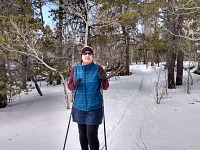 |
| We had moved so that I could enjoy winter. |
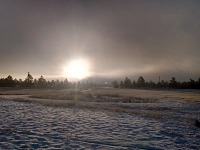 |
| But sometimes there is too much frost even for my enthusiasm. |
One of the reasons for moving to Wyoming was our wish to have four seasons
again. To be more specific — that
I would have my winter,
when I can go cross-country skiing and rejoice over all the beauty in the woods
(just ask my family, they would roll their eyes whenever we enter a snow-covered
forest — for they know that they are bound to listen to my expressions of
joy over the nasty white stuff).
It has been said by some evil people that Wyoming only has two seasons.
Those who must spend a lot of time in their cars, claim that
these are "
winter" and "
road construction".
Settlers in Cheyenne, on the other hand, insist that the true seasons are
"
winter" and "
Frontier Days"
(thus a ten-day rodeo at the end of July — when it's actually quite hot;
then our metropolis — consisting of now almost seventy thousand people
— gets raided by about a quarter million tourists). This year, a brand
new theory has surfaced; it counts on altogether THREE seasons in a year:
"
winter" is obviously given. The opposite of winter then is
either "
road construction" or "
Frontier Days".
And BETWEEN winter and Frontier Days, we get
"
sprinter" — composed from fragments of
winter and
spring. Going the other way, "
winning"
does not seem to fit — this "spring" does not feel like much of
a win.
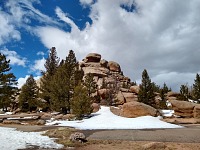 |
| We reckoned that there would not be much snow at Vedauwoo... |
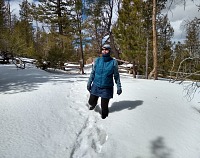 |
| ...but then it wasn't just socks I had to change. |
Ranchers did not win anything indeed — as they had to, over the winter,
intensely and with difficulty, feed their stock in tens of feet of snow (I even
read about hay thrown off from helicopters). Then, in the middle of endless
storms, blizzards and sub-zero temperatures, came calving and lambing. We're
still talking about animals who got somebody to care for them — and who
are equipped to eat hay (as opposed to, for example,
deer).
Now, at the end of April, one hears about some areas having lost over half the
population of wild herbivores.
In our south-eastern tip of Wyoming, we received only a fraction of the snowfall
compared to elsewhere, thus one can spot antelopes, deer, elk and moose here
— who now may excessively push into a more temperate climate — and
consequently near major roads, highways and cities. But even we have the
ominous
sprinter. A storm comes, pours in some snow, goats are sour, and
I set out with nordic or downhill skis — and the next day warms up,
goaties begin to stick their noses out of their shed, my nordic track melts down
so bad that a spot where I waded shin-deep in powder just two days ago, is
impassable — and so on and again.
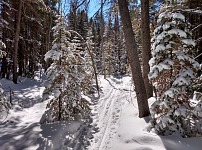 |
| Another pretty snow cover. |
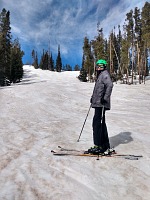 |
| Three days later, skiing was ugly spring-like. |
We reinstalled our
automatic door on the chicken-coop, which opens with
daylight and lets the chickens out, instead of me having to get up before six
due to "stupid early sunrise". Two days later it started raining, then
turned to snow — with frost overnight, and the door froze shut and our
chickens had to linger inside their coop until seven, when I stumbled out,
spending my morning in vain attempts to unfreeze the door. When I finally got
it to open, the system went berserk and kept cycling open/close, and I had to
yank it out of the plug — and reprogram it in the evening (when it was no
longer freezing).
In a similar fashion — like a moron — I kept dragging out from our
barn, unrolling, and then rolling and dragging back into our barn, water
hoses — for I alternatively need water in the agricultural section of our
property (goat shed, compost, vegetable plot), and alternatively I worry about
said hoses bursting with frozen water. My goaties lost track of what is going
on, as on some nights their shed stays open into the run — and on some
nights, even days, they are shut in from whipping wind and snow.
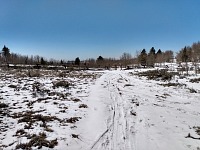 |
| My secret nordic tracks have melted away. |
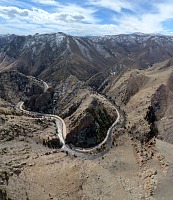 |
| Sid had ventured with his drone to a climbing area called Poudre Palace in Colorado |
When Sid and I embarked on a hike near Turtle Rock at the beginning of April,
I put on my ankle-high trekking shoes, hoping them best to scale some rocks,
possibly overcome shallow mud or water — since we reckoned that the area
around
Turtle Rock should no longer sport much snow — I ended up
dropping knee-deep into old melting snow drifts in the woods.
In contrast —
when Tom and I went to
Snowy Range to ski the slopes on the resort's last
day of the season, two days after a storm — we did not find any good snow.
Of what was there, had a sickly brownish color, and our favorite routes were in
practice impassable — bowls where one would get stuck in coarse wet slush,
and subsequently slide on an icy sheet. The classic groomed routes were
altogether icy. We ended up skiing along traversing trails, which we normally
sneer at — but where grooming had mixed the old snow with the new one to
the extent that it was relatively passable. But for how long does one enjoy the
one and only blue slope, right? After noon (when even this forest path began to
soften), we packed it up and drove to Laramie to have a late lunch. It was the
right decision, since Tom's buddy from the University, with whom we met at the
lift, broke his collar bone in three places later that day. In conclusion, such
spring skiing was worth a wet fart.
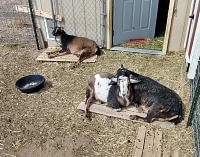 |
| Goaties appreciate spring sunshine. |
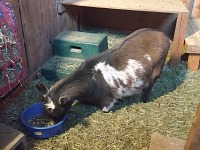 |
| Twilight had to kneel down to feed. |
I had returned to Snowy again at the end of April — when the resort sent
out a note about selling off
old rental skis. Given the fact that I have
been skiing on planks that I had bought used some twelve years ago from Vendula,
I considered beat-up sticks from a rental shop a definite upgrade.
Naturally on my day off from work, when I could take a round trip to the
mountains, a truly April weather came. I left our house in a drizzle, which
turned into a downpour on the interstate (making all the big rigs and larger
cars trail huge water curtains); then I entered in a thick cloud, where everyone
crept along with eyes nailed to the lines on the pavement — emerging into
a sunny winter day with blue skies and sparkling new fallen snow — fading
into another drizzle in the Laramie Valley; then sunshine again — and
close to Snowy, snowfall.
There were four inches of fresh snow under the lifts, which looked weird being
all stopped and without the usual crowds of skiers. It all looked rather funny,
no-one around — except for a guy at the front desk, who admitted to having
my skis set aside for me, and was willing to try to fit them on my giant boots.
In the end I paid thirty dollars and drove back to Laramie to have a lunch with
Tom. Compared to the cost of gas and lunch, those skis were truly for a song.
The only thing I regret is the fact that I would try them out no sooner than
next winter.
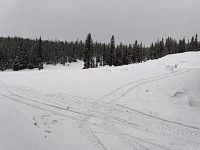 |
| Snowy got snowed in for a change. |
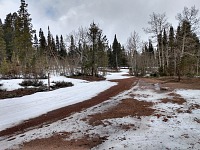 |
| By the nordic area a few miles on - nothing. |
Since it had snowed at Snowy, I expected that the pass between Laramie and
Cheyenne would get the same — and I could go cross-country. I stopped
there — mine was the only car in the parking lot, although according to
tracks left behind, some super dedicated nordic skier had been there before me.
I did not dare to break out my skis, or rather, I was lazy to tape my ankle and
change into boots, in these very sub-optimal conditions; instead, I stepped out
to a short hike. My wood paths were generally bare — groomed and
maintained tracks might have been more or less passable — but I still
think that a walk was adequate. Thus my last nordic outing had apparently
already happened on April 16 — I doubt that the situation with snow
would improve in the "
road construction" season.
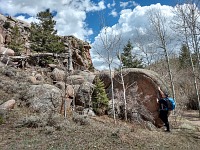 |
| Bearded dude at Vedauwoo - this time effectively snow-free. |
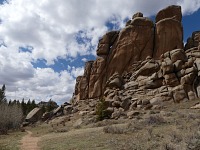 |
| Spring is barely starting at this altitude. |
Since Lisa's admission to the University, we began to organize things for the
next school year. Tom had discovered that as a sophomore, he may live in an
apartment provided by the University, instead of a dormitory. To make it
economically feasible, such flat is usually shared; it is permissible to sign up
Lisa. We had to apply for an exception from the rule that juniors must stay in
a dorm — apparently so that the school would retain tack of them, perhaps
even to keep the first year, who tend to behave like escaped wild animals,
somewhat isolated from "regular" folks. The flat is interesting in
still being largely paid from their scholarship — i.e. not being much more
expensive than the dorm. But my greatest surprise came, when I saw the actual
apartments. I imagined two cramped rooms sharing a bathroom (as opposed to dorms
where showers and toilets are communal for one whole floor). So in our case,
University "apartment" is a townhouse — with a living
room and a kitchen (equipped with a fridge and a stove) on the first floor;
second floor sports two bedrooms and a bathroom. It's a much greater luxury than
where Sid and I started as newlyweds.
Kids had to sign up into a waiting list and then we just waited whether they'd
get it; now they have a contract signed and deposit paid. Tom is happy; life at
the dorms does not suit him — mostly because dorms are always noisy and
busy. His weekend stays at home consist predominantly of sleeping in (besides
frequent raids into the fridge).
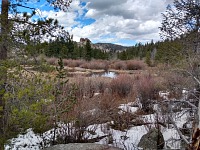 |
| Beavers are busy building dams. |
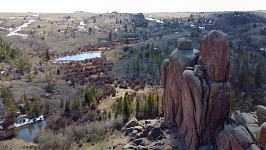 |
| A camel supervises quality of the rodent's work. |
It would appear that our children had again demonstrated somewhat mature spirit
— as Tom accomplished figuring out, tracking down, and setting up decent
accommodations, including the part where it's mostly financially covered by
their scholarships. Then, teen age strikes again and all impressions and good
feelings of having responsible children, fizzle out. That Tom backs his car in
an April snow squall into our (brand new) garage door, happens. But to get
a speeding ticket in a spot where we KNOW that cops meter and catch drivers,
a spot which we KNOW is a bad place to drive fast, is simply inexcusable (at
8,640&ft pass where I myself had an accident a year earlier — because on
this boundary, weather and road conditions change rapidly — one never
knows what one's entering — sunshine and dry blacktop easily change to
fog, snow drifts or hail). We can be glad that it ended with just a ticket,
and not a smashed-up car, or our son.
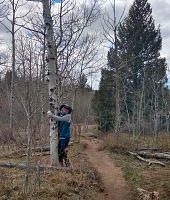 |
| We love to hike in the woods. |
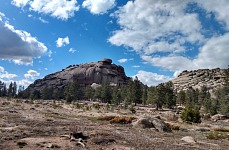 |
| Public campground under Turtle Rock was still closed. |
We had another
animal complication. I took my goats to the vet's in
March to be inoculated. I take them with the Ford truck, and put portable steps
up to the tailgate so that my goaties have a gentler way in and out. Naturally,
when we came back home, Twilight was so upset by the sustained abuse that she
jumped straight down, avoiding the steps. It's not very high and goats are built
for vertical movement — but Twilight is an elderly lady with arthritis,
and all the hassle with steps was there mostly FOR HER. For the rest of the day
she seemed OK, but in the next morning the shock to her diseased joints had
fully manifested and she was barely shuffling. I hold a preventive meloxicam
for her, which fixed her mostly up till the evening — but I noticed that
she was not rushing forward first to the grains, holding back from other goats
instead of bullying and harassing them; that was a disquieting symptom.
I repeated a visit at the vet's, where they found no obvious cause for the
hunger strike. I began to ponder whether the goat was intelligent
(= belligerent) enough to starve in protest. Then I figured it out (call me
Lightning) — when I watched her stuffing herself with hay from the feeder,
which is located level with the goat's head — Twilight is arthritic in her
shoulder joint — and if her shoulder hurts, she cannot bend her head down
— for example into the grain bowl or to the water bucket. And so it was
— when I handed her grains to her mouth, she ate without problems. All I
had to do was placing the water bucket on a raised place and hope that pains and
stiffness of the shoulder joint would diminish over time. In the meantime,
Twilight herself came to a conclusion that she had to deal with her situation,
and began to kneel down to feed. Nevertheless, the whole affair lasted for about
two weeks, before Twilight returned to her original persona of a grumpy goat.
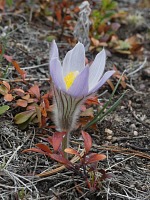 |
| And pasqueflowers bloomed. |
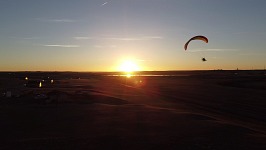 |
| Our neighbor takes to flight in the spring. |
Now consider that it's all still awfully simple with animals — they don't
speak and can't tell you what hurts them, but at least you can SEE it right away
and your attempts to fix it provide immediate feedback. Even so, it took me and
Twilight several days before I deciphered what was going on and could amend and
correct the situation. But what chance does one have with
plants, which
don't communicate? You get your feedback in a week, two or three...
half year?
On April 21, I picked up seedlings of bushes and trees at Conservation District,
and spent two days (with Tom's less than enthusiastic, but neccessary help) by
planting and more planting. Three weeks later is seems that lilacs are doing
alright, currants at ninety percent — but honeylocust trees look all
dead. Now one does not know, what went wrong — or whether just all the
seedlings were simply bad.
This brings me to the point that with the end of April, we can possibly (very
carefully) start talking about
winter having ended. Besides being able
from time to time to work on the property (as the ground is no longer frozen),
little bits of green grass are showing and my goatis can walk out to graze.
During our hike around Turtle Rock on the last of April, Sid and I found
pasqueflowers — and did not have to wade through knee-deep snow drifts.
So maybe... we'll see, what comes by
Mother's Day...
























